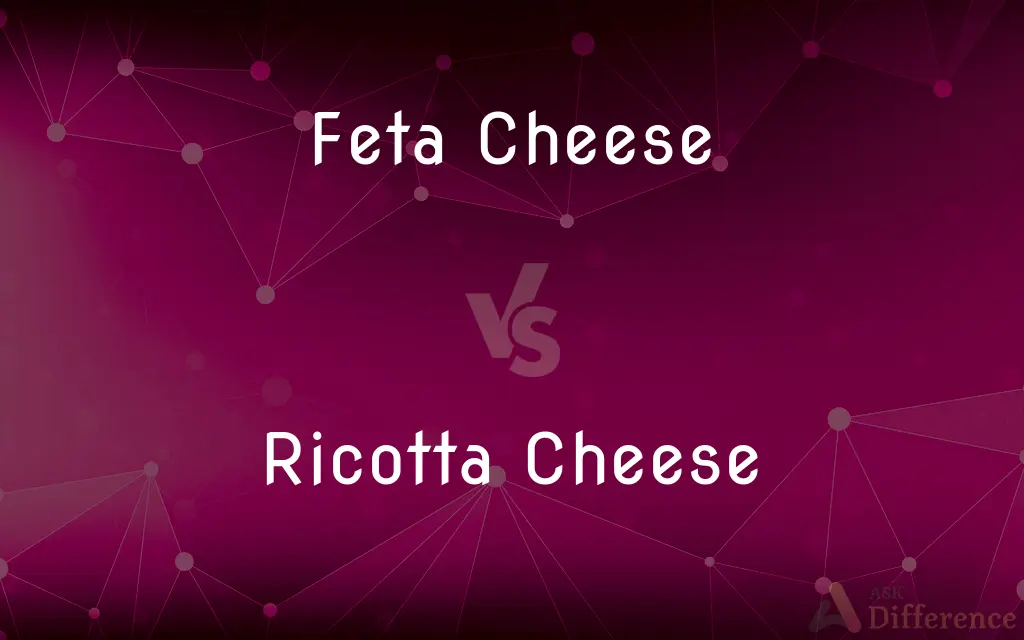Feta Cheese vs. Ricotta Cheese — What's the Difference?
By Tayyaba Rehman — Published on January 31, 2024
Feta cheese is a brined, crumbly Greek cheese made from sheep's or goat's milk, while ricotta cheese is a soft, creamy Italian cheese made from whey.

Difference Between Feta Cheese and Ricotta Cheese
Table of Contents
ADVERTISEMENT
Key Differences
Feta cheese, originating from Greece, is traditionally made from sheep's or goat's milk. Ricotta cheese, hailing from Italy, is made from the whey of sheep, cow, goat, or buffalo milk.
Feta cheese is known for its crumbly texture and tangy, salty flavor, often aged to develop its characteristic taste. Ricotta cheese has a creamy, soft texture with a mild, slightly sweet flavor.
The production of feta cheese involves curdling milk, brining, and aging. Ricotta cheese is produced by reheating the whey from other cheese production, coagulating the remaining proteins.
Feta cheese is a staple in Greek salads, pastries, and as a table cheese. Ricotta cheese is versatile in Italian cuisine, used in lasagnas, cheesecakes, and as a spread.
Feta cheese typically has a higher salt content due to brining, while ricotta cheese is lower in fat and salt, making it a lighter option.
ADVERTISEMENT
Comparison Chart
Origin
Greece
Italy
Primary Milk Source
Sheep's or goat's milk
Whey from sheep, cow, goat, or buffalo milk
Texture
Crumbly
Creamy, soft
Flavor
Tangy, salty
Mild, slightly sweet
Common Culinary Uses
Greek salads, pastries, table cheese
Lasagnas, cheesecakes, spreads
Compare with Definitions
Feta Cheese
Often used in Mediterranean cuisine.
Feta cheese is essential in Greek salads.
Ricotta Cheese
An Italian whey cheese with a soft texture.
Ricotta cheese is used in many Italian desserts.
Feta Cheese
A brined Greek cheese made from sheep or goat milk.
She crumbled feta cheese over her salad.
Ricotta Cheese
Made from leftover whey from cheese-making.
Ricotta cheese is a byproduct of cheesemaking.
Feta Cheese
Contains higher salt content.
Feta cheese is salty due to its brining process.
Ricotta Cheese
Lower in fat and salt than many cheeses.
Ricotta cheese is a healthier cheese option.
Feta Cheese
Known for its crumbly texture and tangy flavor.
Feta cheese adds a tangy taste to dishes.
Ricotta Cheese
Used in pasta fillings and cheesecakes.
She filled the cannoli with sweetened ricotta cheese.
Feta Cheese
Aged and stored in brine.
Aged feta cheese has a rich flavor.
Ricotta Cheese
Has a mild and slightly sweet flavor.
The ricotta cheese added a delicate sweetness to the dish.
Common Curiosities
How is feta cheese made?
From sheep's or goat's milk, aged and stored in brine.
How is ricotta cheese made?
By coagulating the proteins in the whey left from cheesemaking.
What is ricotta cheese?
A soft, creamy cheese made from whey, originating in Italy.
Is ricotta cheese suitable for baking?
Yes, especially in desserts and lasagnas.
What is feta cheese?
A salty, crumbly cheese traditionally from Greece.
What does feta cheese taste like?
It has a tangy, salty flavor.
Is ricotta cheese a healthier option?
Yes, it's lower in fat and salt.
What's the texture of feta cheese?
Crumbly and firm.
Is feta cheese healthy?
In moderation, though it's high in salt.
What does ricotta cheese taste like?
Mild and slightly sweet.
What's the texture of ricotta cheese?
Creamy and smooth.
Can you cook with feta cheese?
Yes, it's great in baked dishes and salads.
What dishes use ricotta cheese?
Lasagna, ricotta cheesecake, and cannoli.
Can you substitute feta for ricotta?
Not directly, as they have different textures and flavors.
What dishes use feta cheese?
Greek salads, spanakopita, and as a table cheese.
Share Your Discovery

Previous Comparison
O Acylation vs. N Acylation
Next Comparison
Inner Core of the Earth vs. Outer Core of the EarthAuthor Spotlight
Written by
Tayyaba RehmanTayyaba Rehman is a distinguished writer, currently serving as a primary contributor to askdifference.com. As a researcher in semantics and etymology, Tayyaba's passion for the complexity of languages and their distinctions has found a perfect home on the platform. Tayyaba delves into the intricacies of language, distinguishing between commonly confused words and phrases, thereby providing clarity for readers worldwide.













































